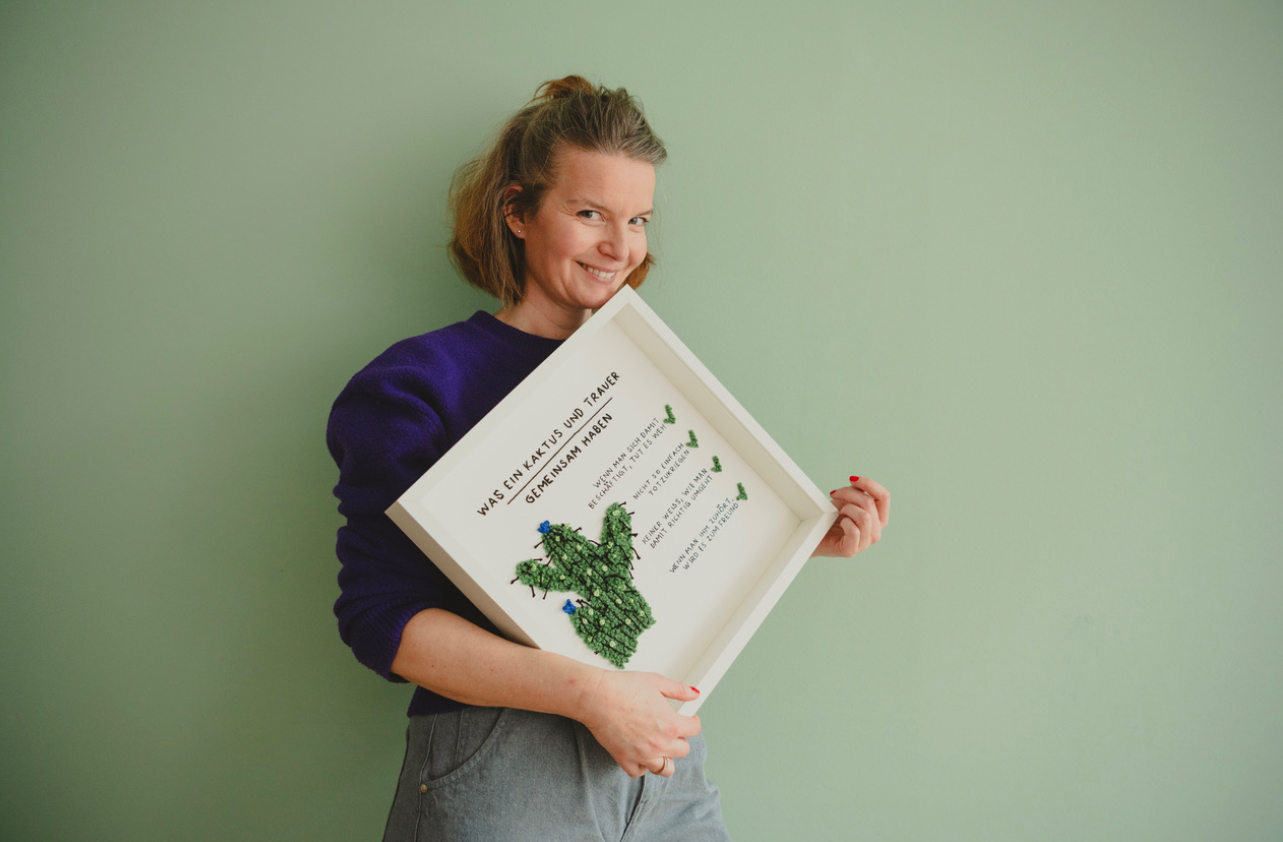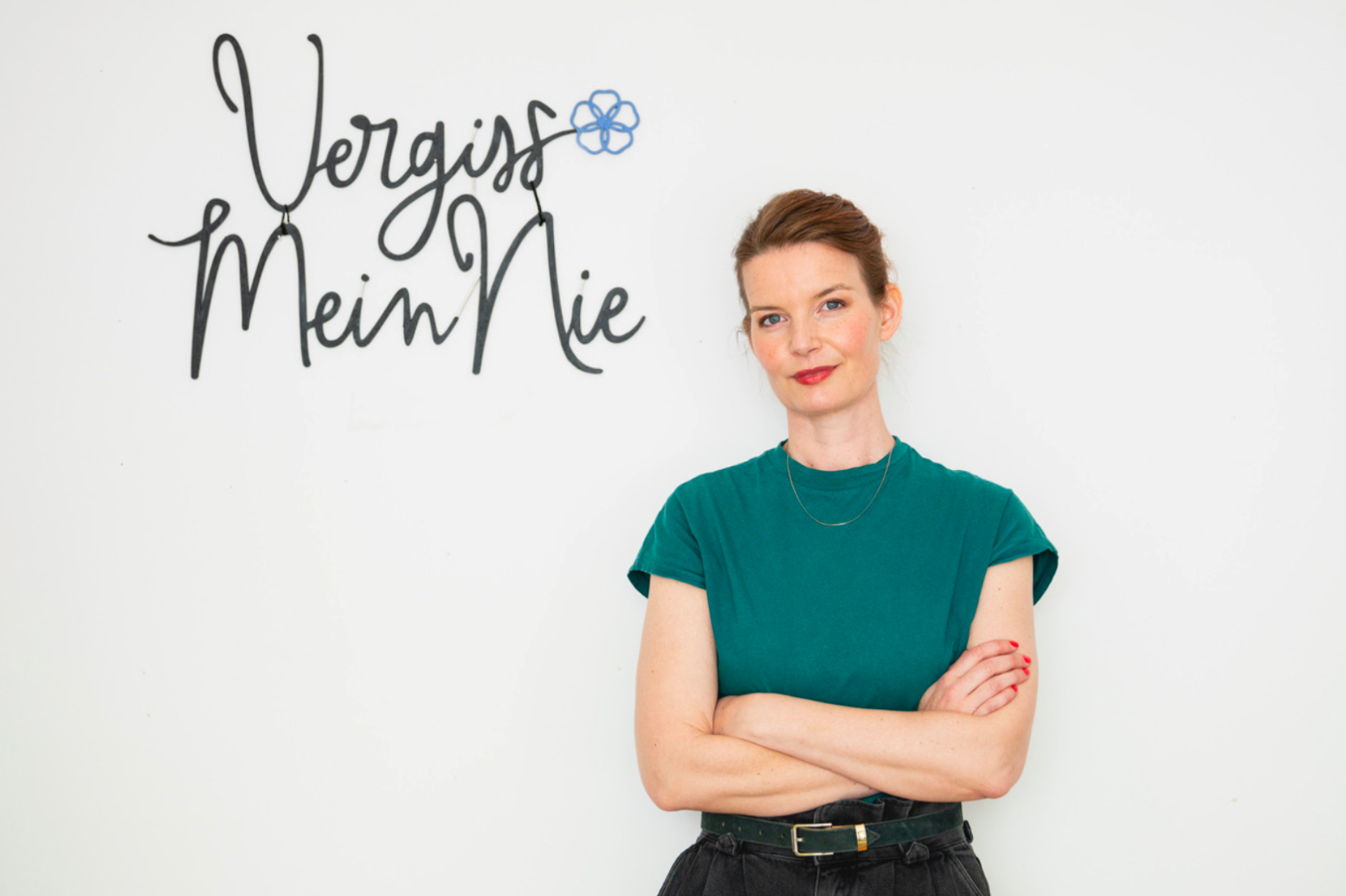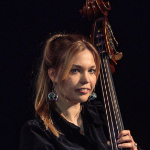The Art of Resonance in Mourning
14. February 2025
#1to1dialogues

Franziska: Dear 1:1 community, we are delighted to be back with the 1:1 DIALOGUES - a format that we trialled for the first time last winter and talked to lots of great guests about topics that are close to our hearts in the 1zu1 format. We've come up with something very special for this season: we want to surprise ourselves and others - a central theme at the 1zu1 concerts. I have chosen a new guest who is about to meet Christian, who doesn't yet know about his good fortune. So we surprise each other - I surprise Christian and Christian surprises me - and we always bring in exciting guests who have a particular theme in mind. Today I'd like to welcome Anemone Zeim.
Anemone, you are in Hamburg and have created a fantastic project, product and place that deals with grief work: "Vergiss mein nie". We know each other from the context of the Kultur- und Kreativpiloten. Your project and our 1:1 CONCERTS were honoured in 2021, the famous Corona online year. Unfortunately, we didn't get to see each other live this year and are now making up for it.
In the run-up to this 1:1 DIALOGUE, we discussed that we wanted to talk about the topic of resonance. Christian doesn't know anything about it yet, but there are certainly strong connections in your work and in our work and you have the next 15 minutes to get to know each other and then decide for yourselves where the journey will take you on this topic. Are you as excited as I am?
Anemone: I'm super excited. I look really cool, but inside I'm bubbling over and I'm really excited and looking forward to the next 15 minutes
Franziska: Great, then I will take you to Christian now - have fun!
####################
 © Ilona Habben
© Ilona Habben
Anemone: Hi, it's a bit like a blind date.
Christian: Yes, definitely.
Anemone: I'm delighted to meet you. I'm Anemone, I'm from Hamburg. What I do is make the invisible visible in various areas, especially on the subject of grief. I came up with a certain name because we approach grief work and coping with grief a little differently at "Vergiss mein nie", a little more non-denominational, creative and colourful. Without it being very wild, it's design therapy, so to speak, with a good dash of humour and a lot of grief expertise. And Franziska asked me if I would like to surprise you or if she could surprise you with me. And here I am and I would like to talk to you about the topic of resonance, if you like.
Christian: Okay, I'd love to. So I'm very happy to meet you here. I was a bit excited because I didn't know who and what I was going to get here. Yes, the topic of resonance is a very intrinsic topic, because for us it doesn't have so much to do with the ephemeral. But this resonance in which you work almost goes into a transcendental realm. Or how would you describe it?
Anemone: Yes, I also thought about it beforehand, but it's not that difficult for me to draw a connection. We have a training programme, for example, and we have a big workshop on the subject of resonance. My work somehow makes a lot of people feel strange, because grief is of course a totally taboo subject and people sometimes try not to get "infected" with this topic. But it's not so dark and gloomy, it's work among people, creating a connection, so to speak - on the one hand to the person who is grieving and doesn't know what to do and me as the person who somehow sorts it out, pulls it apart like a ball of wool. Of course, I want to resonate with this person, who in turn somehow also sparks a transcendental, perhaps something, in order to perhaps come back into resonance with their deceased person.
Basically, however, it's a theme that connects us, perhaps resonance, the parallel we have is bringing people into the moment. Because the moment is safe. So many people are afraid of the future or want to hold on to the past, which is always a bad idea. And I think being in the here and now and then vibrating together is such a moment, it's so timeless, isn't it? Timelessness and the moment when you say: "Everything is fine here."
And at the same time, of course, it's a total dissonance when someone doesn't understand me, yes, when I perhaps want to talk to someone in my grief and the person gives me some kind of empty phrase or somehow gives me something that doesn't fit or I don't feel heard.
Christian: Yes, and the topic particularly resonates with me at the moment because there have been three deaths in my family and among my friends and acquaintances in the last two months. So I have to do a bit of grief work with myself. On the one hand, this resonating with the deceased person, but also resonating with people who are closer to the deceased person and are grieving, for example at a funeral service. Interestingly, in Switzerland this is called an abdication. So it also has something to do with giving thanks and expressing gratitude to life, to what continues to resonate, and I think that's a very central point when it comes to funeral services. Do you also help shape it? Is it also part of your job or is it more a part of your psychological work?
Anemone: Well, we are more of a link between the social system and psychology. So grief is a bit of an in-between space that isn't quite covered by psychology for various reasons, because grief isn't an illness that you can tick off in the catalogue. We sometimes organise funeral services, but not mainly, but of course it's a super important point of closure and celebration, which is somehow important. So funeral service - super important point - never cancel!
What I find really interesting is that many people are so afraid of the topic. Maybe that's because you always feel so compelled at a funeral service - after all, it's somehow a stage for not-so-popular feelings such as grief, sadness and crying. And I also find it incredibly moving to be touched and to cry, don't you? Also by music, for example. There are pieces of music that make me cry, regardless of the situation, and that immediately put you in that mood again, don't they?
We have this one workshop that we organised with the artist XYZ, who worked entirely on the subject of resonance. For example, he creates sound pictures with water, he transforms water waves into sound, so to speak. My most important realisation on the subject of grief and resonance was that it's like throwing a stone into water - the water starts to vibrate. In speaking, singing and music, it is the sound waves that continue to move in a similar way to the water.
Christian: Like a domino chain, and it goes on and on and on.
Anemone: Yes, humans are largely made up of water. That means that when I speak to you, the cellular water vibrates in the pitch of my voice, in my voice. It's very typical. And you can't escape it at all.
With grief work, you often have the feeling that you have to do a lot now, but sometimes it's enough to just be together and vibrate together or to really say things that will definitely resonate with the other person, even if they can't hear it yet. Music or what I say to you resonates within you. And you can decide whether it somehow resonates or whether it is dissonant. And I think it's totally crazy that we as humans can get so close to each other, even through sounds that we make and simply send lovingly in the other direction. I find that so connecting, don't you? So this feeling that I'm saying something to you and your whole cellular water is now vibrating to the rhythm or pitch that I'm making.
Christian: Yes, so resonare comes from the Latin and means it resounds again, it sounds again. It's this echo that resounds again and resounds again in a different place and comes back to us. So it's actually a dialogue, if you like. And I find this dialogue particularly fascinating in your field. Yes, to a certain extent with the beyond.
I'll come back to the funeral service I was talking about, it was so crazy because it was completely planned by the person who was no longer present. He spoke to everyone, so there were also some examples and snippets of dialogue that an actor recited, from various messages, WhatsApps, letters and so on. And the response was really crazy. Not like these normal celebrations where people announce all the great things this person has achieved in their life, but no, it was a very subtle vibration. I think that goes really well with the resonance, which in turn stimulated you and made something else vibrate.
Anemone: Totally. And I think that's a second theme. It's also largely about memories, about the echo that someone leaves behind in a space. And the space can be "family", can be "you as a person", can be "funeral service". So it's not the original, it's always an echo and it's always distorted by the person who talks about it and shares memories - one of the most powerful tools. So I record something and experience something with someone and then years later I tell them about it and pass it on. And it's such a time-delayed wave that is incredibly effective. As a grieving person, there's almost nothing better than being given an unexpected beautiful memory from someone you didn't even know, is there? That's why memorial services are so important, simply so that we can share memories together.
Christian: Absolutely. And there's also a very strong subjective factor. It reminds me of the wonderful novel "Falschgeld" by my friend Matthias Matschke, which I read a few years ago. It begins with a foreword that reads: "It is not reprehensible to remember something that didn't exist." In other words, when I tell you an anecdote, for example, I naturally colour it. Then it comes back to you in some way. And so this resonance takes on a new colour via the different resonating bodies, such as people or rooms or whatever. And that doesn't mean that it has nothing to do with the truth, but that it adds a little colour and changes the way the sound is transmitted, depending on which transmitter it is sent on through. I think that's quite a nice image.
Anemone: Yes, I experience that in my work too. I have a memory workshop where we create memorabilia, so we transform things. A small example: my mother had a jumper that she knitted herself. Then she died, her daughter took it with her and it's lying there with her and she can't wear it because it's her mother's jumper. But she can't throw it away either. That's why it's kind of an in-between world. And what we do is think together about what works. Yes, it's about the material and the smell - not about the jumper. And in this case, we unravelled it and knitted it into a scarf: So a transformation of the valuable material. And made it into her piece. And anyone else would have done it differently, even with memories. Memories are super subjective. And it's not like questioning a witness at the police station. That's not even possible.
I once read that when we experience something, it forms in our brain. And when we remember it, preferably when it's a nice memory, our brain takes on the same structure as the moment it happened. That's why my memories feel so good. But of course it gets watered down and of course we are more than just a computer that stores data. And that's also really nice when things are allowed to change and develop and you can compare them again.
When you ask how long mourning lasts, when mourning is finally over (my number one question, by the way), when you no longer revolve around this moment of loss, why, why why why, but when you take the best of the past and transform it for yourself (like this jumper) and knit an alternative present and new future from it. So if you can take the person and what you experienced with them with you and your entire resonance and say, hey, I've learnt this from my friend now or this is something I share with my mother and I'll keep cultivating it, I'll keep living it because this person will also become a part of my culture, will continue to walk with me. And I don't get stuck in the past and try to pour the person into a jar or put them in a museum, but I continue to cultivate them, which is a good, easier process that often leads to relief or alleviation.
Christian: Yes, absolutely, and I believe that this whole grieving process is much more about those who are still here, i.e. those left behind, and not so much about the deceased. And you often experience when someone is no longer there, especially at funeral services, that "he or she would have wanted it that way" where I always think that it doesn't matter at all, so the deceased no longer even notices. The point here is that we, the bereaved or those of us who live on, have to move on, to put it positively. And it's very important to focus on ourselves as mourners and look at what we need in order to move forward positively and be able to process.
Anemone: And that's really difficult. So on the one hand, at the beginning, when a loss happens, you're in a kind of state of shock: you can't resonate with your own feelings at all. It's like a frozen goldfish pond - you see the goldfish but somehow you can't reach them. That's why you can't say exactly what you want now and what you desire. But that's actually the key. That's why grief is simply a labour of time. And also communality, sharing memories, sharing closeness, sharing things and also resonating with the change and perhaps getting involved in new melodies, that it may somehow vibrate differently in the future.
Christian: Yes, because the balances have also shifted and you have to become part of the new and steer through it as a pilot instead of being a sufferer or victim of the grieving process. It's so important for a good resonance to rebalance and reinterpret this in a positive way.
Anemone: I would like to share another story with you because I have experienced very strong grief myself. When I was very young, my sister died and I was very lost and there were no professional offers, but I started taking singing lessons out of an impulse and it was incredibly interesting how that helped me. Getting the whole body to vibrate again and also "crumbling away" what had become so rigid. It was so liberating to devote myself to different topics and songs, but also to realise that if I don't feel good, then I won't have a good voice. It was actually a kind of coping with grief for the whole body.
Christian: Yes, and not just for the individual, but also for the collective, when I think back to that funeral service. How we sang as a mourning community in dialogue with a madrigal choir. And singing as a collective in a congregation at a funeral service is so important because everything simply resonates through our bodies and not just through speaking, but also because it sets us in motion and allows us to let go. And this grief doesn't become static, but can experience a lightness through the music, through the swinging.
Anemone: And there is also more than just words and language.
Christian: Yes, absolutely. This conversation with you is a big surprise for me. Of course, there are a lot of personal things involved. It's a topic that most of us are familiar with. The older you get, the more you know about it. In that sense, it's universal. And I think it's very important and great that there's such a sensitive person like you who can help with resonance. I would like to take this opportunity to thank you for this wonderful exchange.
Anemone: Thank you so much, how nice that I was able to surprise you in a positive way. Thank you very much for this lovely conversation Christian.
 © Ilona Habben
© Ilona Habben
###################
Franziska: Annemone, Christian, welcome back. Now, of course, I'm super curious about how you're doing. It seems to have been emotional.
Anemone: Yes, well, I mean, there's far too little time, Franziska, you know that yourself. It was a wild ride, I would say, on my emotional wave and we tried to touch on everything briefly and I found it very inspiring to talk to you, Christian, and very touching too and thank you for getting involved in this not so popular topic.
Christian: Yes, so my thanks go to you, Anemone. I've already said that it was a wonderful surprise for me to speak to you. It's a topic that I have a lot of experience with and of course have personal points of contact with, like many people, but to see it again through this filter by choosing the motto, the resonance, I thought it was really important and it also opened up new channels for me. And above all, to see through this musical aspect how music, how singing, how flowing in resonance can be a very important part of this grief work.
Yes, I'm a bit speechless now and am definitely very touched by our wonderful, resonating blind date, dear Anemone. A thousand thanks to you. Behind you is "Don't forget me", so I will definitely not forget you and this conversation.
Franziska: Yes, thank you very much. I'm really glad to hear that you had a good time. Many thanks to you both for embarking on this adventure. And I hope you and our listeners have a great day.
